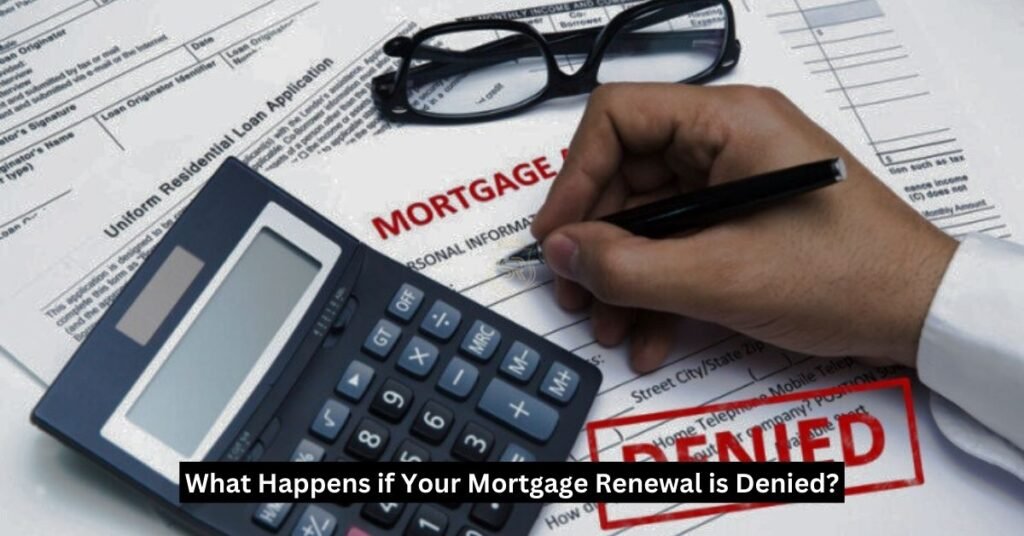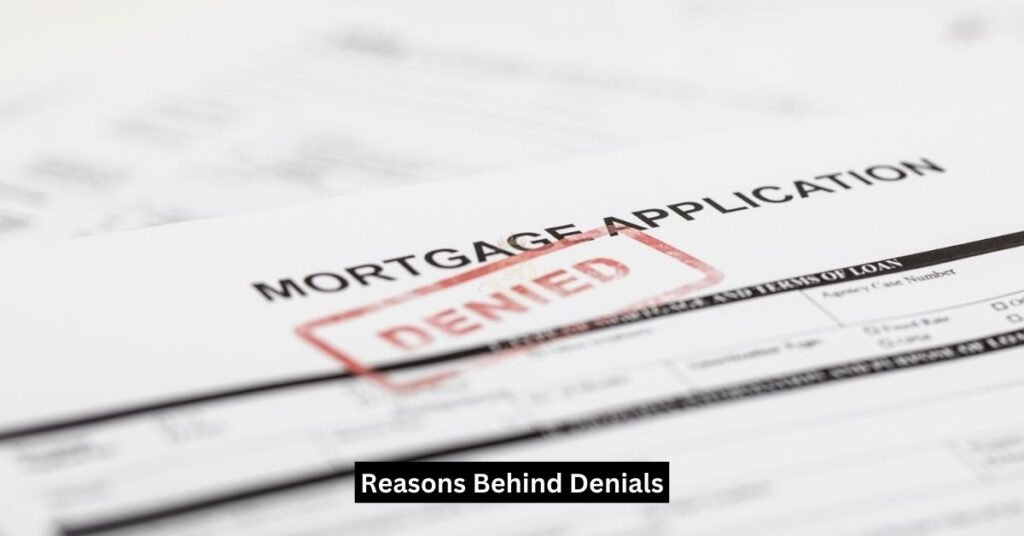In the intricate world of homeownership, the rhythm of financial stability is often set by the melody of mortgage renewals. As Victor Hugo eloquently put it, “Even the darkest night will end, and the sun will rise.” In the symphony of homeownership, denied mortgage renewals are unexpected dissonances, disrupting the flow of financial stability.
Yet, what if this harmonious renewal is denied, leaving homeowners facing uncertainty about their financial future? This guide delves into the intricacies of denied mortgage renewals, shedding light on reasons, solutions, and proactive steps to navigate this challenge.

Table of Contents
ToggleUnderstanding Mortgage Denials:
Denied mortgage renewals can stem from missed payments, a poor credit score, or significantly higher debt. The financial landscape is ever-shifting, and being prepared for potential denials is crucial. Financial institutions reserve the right to refuse renewal, but homeowners need not hastily consider selling their houses.
Seeking Solutions with a Mortgage Broker:
When faced with a denied renewal, consulting a reputable mortgage broker is a strategic move. These experts navigate the complex realm of lenders, traditional and alternative alike. Mortgage brokers possess the acumen to locate a lender willing to renew even when the previous lender won’t, offering solutions beyond the immediate setback.
The Challenge of Switching Lenders:

Opting for a new lender is a common response to a denial. However, this path comes with its own set of challenges. Submitting a new mortgage application requires stringent scrutiny of financial details. The new lender, unfamiliar with the borrower’s history, necessitates income verification, credit assessments, and adherence to mortgage stress tests.
Smart Insight:
As a new applicant, passing a mortgage stress test is imperative, with a benchmark of 5.25% or the contract rate + 2%, whichever is higher. In today’s market, where rates surpass 5.25%, this criterion gains heightened significance, emphasising the need for meticulous financial preparation.
Reasons Behind Denials:

In the intricate dance of homeownership, the prospect of a denied mortgage renewal introduces a complex choreography of financial intricacies. Let’s delve into the multifaceted reasons why your mortgage renewal might face a roadblock, each point unravelling a layer of understanding.
Missed Payments:
- Behavioural Impact: A spotless history of timely payments is akin to a virtuoso performance that lenders appreciate. It reflects positively on your financial discipline.
- Potential Denial: Conversely, a history marred by missed payments disrupts this harmonious rhythm, emerging as one of the foremost reasons lenders hesitate to renew.
When you consistently pay your bills on time, it’s like putting on a flawless performance for lenders. They view this positively because it demonstrates your financial discipline and responsibility. It’s akin to showcasing your ability to manage your money effectively, which lenders greatly appreciate.
Conversely, if your payment history is tarnished by missed payments, it disrupts this positive impression. It becomes one of the primary reasons why lenders might hesitate to extend further credit or approve a loan for you. It’s like introducing a discordant note into an otherwise harmonious melody, causing lenders to question your reliability and trustworthiness with their funds.
Changes in Employment:
- Income Verification: Lenders often re-verify their income during renewal, especially in economic downturns marked by job losses and hiring freezes.
- Longevity Matters: A long-standing history with your employer and a stable income are factors that contribute to lender confidence. Recent job loss or income reduction may elevate the risk of denial.
Income verification is a process where lenders check to make sure you’re still earning the same amount of money, especially when you renew something like a loan or mortgage. This is particularly important when the economy is going through tough times, like when people are losing jobs and companies aren’t hiring much.
How long you’ve been with your employer and how steady your income has been are important to lenders. If you’ve been with the same employer for a long time and your income has been consistent, it makes lenders feel more confident about lending you money. But if you’ve recently lost your job or your income has gone down, it could make lenders worry and might even lead to them saying no to your loan or mortgage application.
Poor Credit Score:
- Credit Score Scrutiny: Lenders may scrutinise your credit score during renewal, particularly if there are concerns about your ability to meet mortgage obligations.
- Credit History Impact: A poor credit score resulting from missed payments or changes in income can become a red flag, potentially leading to denial.
When you renew something like a loan or mortgage, the people lending you the money might take a close look at your credit score. They do this to make sure you’re still able to pay back what you owe, especially if they’re worried you might have trouble keeping up with your mortgage payments.
If your credit score has dropped because you missed payments or your income changed, it could be a problem. Lenders see a low credit score as a warning sign. It might even lead them to say no to your request for a loan or mortgage renewal.
Debt Servicing Ratios:
- Financial Ratios Analysis: Lenders employ specific ratios to gauge your ability to afford new mortgage payments. Key components include income, total debt, mortgage payments, and housing costs.
- Threshold Considerations: Falling below the lender’s debt servicing ratio limits can trigger denial, as it indicates a potential strain on your financial capacity.
Sure! Let me simplify that for you:
When you want to get a loan for buying a house (like a mortgage), lenders look at certain numbers to see if you can manage the payments. They use something called “financial ratios” to do this. These ratios include things like how much money you make, how much debt you have, how big your mortgage payments would be, and how much you spend on housing overall. By looking at these numbers, lenders can decide if you’re likely to be able to handle the payments for a new mortgage.
Smart Insight:
In the realm of federally regulated lenders, timely notification about renewal decisions—usually at least 21 days before the term concludes—is mandated. Proactive communication and addressing potential concerns before the renewal assessment can play a pivotal role in averting denials.
Understanding these nuanced aspects of mortgage denial empowers homeowners to navigate the renewal process with foresight and resilience. Each bullet point unravels a layer of the intricate tapestry that is mortgage renewal, offering insights to bolster financial preparedness and enhance the chances of a seamless renewal experience.
Exploring Alternative Options:

Understanding and exploring alternative options can transform this setback into an opportunity for strategic financial manoeuvring. Let’s delve deeper into the hierarchy of alternatives, each presenting a nuanced lifeline for homeowners facing the intricacies of mortgage renewal in challenging circumstances.
Finding a B Lender:
- Transitioning from A to B: If your original mortgage journey involved an A lender, typically a bank or credit union, consider engaging with a B lender. B lenders, often trust companies or institutions catering to individuals with lower credit scores or higher debt, can offer a viable pathway.
- Nuanced Criteria: B lenders operate under different criteria, allowing for more flexibility in certain financial aspects. Understanding their nuanced requirements is crucial for homeowners navigating this transition.
Transitioning from A to B can be a smart move for homeowners looking for more flexibility in their mortgage options. Lenders, like banks or credit unions, are the usual go-to for many borrowers. However, if you find yourself in a situation where your credit score isn’t perfect or your debt is on the higher side, it might be worth considering a B lender instead.
B lenders, often represented by trust companies or specialized institutions, cater to individuals facing these kinds of challenges. They offer an alternative pathway to homeownership, providing opportunities that might not be available with traditional lenders. While the terms may differ, B lenders can still offer viable solutions for those seeking mortgage options outside the standard criteria of A lenders.
Understanding the nuanced criteria of B lenders is crucial for homeowners contemplating this transition. Unlike A lenders, B lenders operate under different sets of rules and guidelines. They often have more flexibility in certain financial aspects, which can be advantageous for borrowers with unique circumstances. Being aware of these specific requirements will empower homeowners to navigate the transition smoothly and make informed decisions about their mortgage journey.
Consulting Private Lenders:
- Extreme Scenarios: In cases where credit scores are extremely low, and even B lenders pose challenges, turning to private lenders becomes an option. Private lenders, though not ideal due to potentially higher interest rates, can provide a lifeline for those in dire financial straits.
- Cost-Benefit Analysis: Engaging with private lenders demands a thorough cost-benefit analysis. While they offer a solution, the potential long-term financial implications, especially with elevated interest rates, warrant careful consideration.
When you’re thinking about borrowing money from private lenders (like banks or other companies), it’s important to do something called a “cost-benefit analysis.” This means you need to carefully think about whether borrowing money from them is worth it. Even though private lenders can give you the money you need, you have to consider the costs and benefits. For example, you’ll need to think about how much you’ll have to pay back in the long run, especially if the interest rates are high. So, before you decide to borrow money from a private lender, make sure you think about whether it’s the best choice for you financially.
Smart Insight:
Navigating the alternative landscape requires a comprehensive understanding of each option’s intricacies. Engaging with B lenders and private lenders demands not just a shift in approach but a strategic alignment with individual financial circumstances.
As homeowners contemplate these alternative avenues, a key consideration is the long-term financial impact. While the immediate goal is securing a mortgage renewal, ensuring that the chosen alternative aligns with broader financial objectives is paramount. The process becomes an exercise in balancing short-term needs with the enduring financial health of one’s homeownership journey.
In essence, exploring alternative options transcends the immediate challenge of denial, evolving into a strategic financial decision. Each avenue holds its unique nuances, and homeowners can navigate this terrain with confidence by delving into the specifics of B lenders, private lenders, and the intricate balance between immediate needs and long-term financial resilience.
In conclusion, navigating the intricate landscape of denied mortgage renewals requires homeowners to approach the situation with resilience and strategic foresight. While denied renewals may initially disrupt the rhythm of financial stability, proactive steps can mitigate the impact and pave the way for a smoother transition.
Engaging with a reputable mortgage broker emerges as a crucial first step, offering expertise and access to a diverse array of lenders, both traditional and alternative. Despite the challenges of switching lenders, homeowners can explore alternative options such as B lenders and private lenders, each presenting unique lifelines tailored to individual financial circumstances.
However, it’s imperative for homeowners to conduct thorough cost-benefit analyses and ensure that chosen alternatives align with broader financial objectives. While the immediate goal is securing a mortgage renewal, the long-term financial health of the homeownership journey must not be overlooked.
Ultimately, by understanding the reasons behind denials, exploring alternative options, and balancing short-term needs with long-term financial resilience, homeowners can navigate the complexities of denied mortgage renewals with confidence and emerge stronger on the other side.

4 thoughts on “What Happens if Your Mortgage Renewal is Denied?”
Wow, wonderful blog structure! How long have you ever been blogging for?
you make running a blog glance easy. The full look of your web site is wonderful, as neatly as the content material!
You can see similar: sklep internetowy and here ecommerce
Hi there! Do you know if they make any plugins to help with Search Engine Optimization? I’m trying to get my
blog to rank for some targeted keywords but I’m
not seeing very good success. If you know of any please
share. Kudos! You can read similar blog here: Backlink Building
Wonderful website. A lot of helpful information here.
I’m sending it to several friends ans also sharing in delicious.
And certainly, thanks to your sweat!
[url=http://oazithromycin.com/]order azithromycin online[/url]